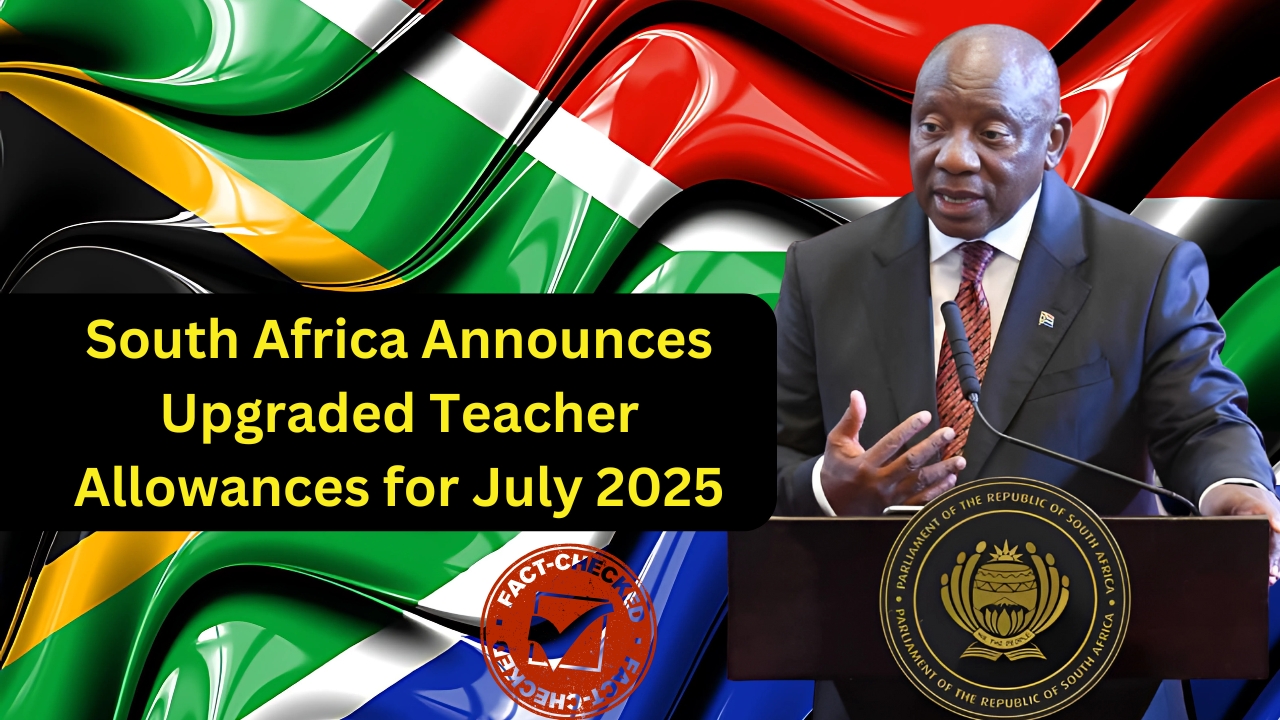South Africa Announces Upgraded Teacher Allowances for July 2025: The South African education sector received a significant boost in 2025 as the government officially announced substantial upgrades to teacher allowances and compensation packages. This landmark decision represents one of the most comprehensive reforms to educator compensation in recent years, addressing long-standing concerns about teacher retention and the ongoing skills shortage in the education sector.
Historic Salary Increases Take Effect
The Department of Basic Education has officially gazetted new salary structures that came into effect retroactively from April 1, 2025, following intense negotiations between public sector unions and government officials. The agreement secured a noteworthy 5.5% wage increase for all teachers across the country, marking a significant victory for educator advocacy groups who have long campaigned for better compensation.
This increase follows a multi-year wage agreement that extends beyond 2025, with CPI-linked adjustments planned for 2026 and 2027. These future adjustments are strategically capped at 6% and will not fall below 4%, providing teachers with predictable income growth while protecting against extreme inflation fluctuations.
Understanding the New Salary Structure
Entry-Level to Senior Educator Compensation
The revised compensation framework operates on a sophisticated 432-notch system that reflects the diverse experience levels and qualifications within the teaching profession. At the foundation level, newly qualified teachers now earn a minimum annual salary of R163,179, which translates to approximately R13,600 per month. This represents a substantial increase from the previous year’s starting salary of R154,671.
For seasoned educators at the pinnacle of their careers, the maximum salary has reached R1,275,789 annually, equivalent to R106,300 monthly. This top-tier compensation reflects the government’s recognition of experienced teachers’ invaluable contributions to educational excellence and institutional leadership.
Qualification-Based Differentiation
The salary structure carefully considers various factors that influence educator compensation. The Relative Education Qualification Value (REQV) system ensures that teachers with advanced degrees and specialized certifications receive appropriate recognition through enhanced compensation packages. This systematic approach encourages continuous professional development while attracting highly qualified candidates to the profession.
Comprehensive Allowance Package Enhancements
Housing and Medical Benefits
Beyond base salary improvements, the government has significantly enhanced various allowance categories that directly impact teachers’ quality of life. Experienced educators now receive approximately R1,998 monthly for housing allowances, while medical subsidies have increased to R3,700 for veteran teachers. These allowances provide crucial support for daily living expenses and healthcare needs.
Teachers under 50 years of age with substantial experience receive proportionally adjusted allowances, while entry-level educators benefit from R750 monthly housing subsidies and R1,800 medical allowances. This tiered approach ensures that support increases alongside career progression and financial responsibilities.
Pension and Insurance Coverage
The enhanced package includes robust pension contributions equal to 13% of basic salary, providing teachers with substantial retirement security. Additionally, comprehensive insurance coverage and annual service bonuses further strengthen the overall compensation structure, making teaching a more financially attractive career choice for both current and prospective educators.
Addressing Critical Skills Shortages
Mathematics Education Crisis
The timing of these allowance upgrades is particularly significant given South Africa’s acute shortage of qualified mathematics teachers. Current statistics reveal that 464 public schools cannot offer mathematics instruction due to insufficient qualified educators. The enhanced compensation package specifically aims to attract skilled professionals to these critical subject areas.
Industry experts, including union representatives, have identified poor human resource planning as a contributing factor to this shortage. The improved allowances represent a strategic response to this challenge, making specialized teaching positions more competitive with private sector opportunities.
Regional Variation Considerations
The new allowance structure acknowledges geographical differences in living costs and educational demands. Urban educators in high-cost areas receive appropriate adjustments, while rural teachers benefit from additional incentives designed to improve educational access in underserved communities.
Implementation Timeline and Budget Allocation
Phased Introduction Strategy
The government has allocated approximately R55 billion annually to fund these comprehensive improvements, demonstrating unprecedented commitment to educational excellence. Implementation began retroactively in April 2025, with additional enhancements scheduled for July 2025 as part of broader public sector improvements.
This phased approach allows for careful budget management while ensuring immediate benefits for educators. The National Treasury has confirmed funding through budget reallocations and higher-than-expected tax revenues, ensuring sustainable long-term implementation.
Teacher Salary Comparison Table
| Experience Level | Annual Salary (2024) | Annual Salary (2025) | Monthly Increase | Housing Allowance | Medical Allowance |
|---|---|---|---|---|---|
| Entry Level (Notch 001) | R154,671 | R163,179 | R708 | R750 | R1,800 |
| Mid-Career | R682,475 | R720,011 | R3,128 | R1,500 | R2,750 |
| Senior Teacher | R985,320 | R1,039,513 | R4,516 | R1,998 | R3,700 |
| Maximum Level (Notch 432) | R1,209,279 | R1,275,789 | R5,542 | R1,998 | R3,700 |
Impact on Educational Quality
Retention and Recruitment Benefits
These substantial improvements address decades of educator migration to higher-paying sectors and international opportunities. By making teaching financially competitive, the government anticipates improved retention rates and enhanced recruitment of qualified professionals, particularly in specialized subject areas.
The enhanced compensation package acknowledges teachers’ professional value and societal contribution, potentially reversing the trend of qualified educators leaving the profession. This retention improvement should directly translate to better educational outcomes and increased institutional stability.
Long-term Educational Investment
Industry analysts view these allowance upgrades as strategic investments in South Africa’s educational future. Improved teacher compensation typically correlates with enhanced educational quality, better student outcomes, and stronger economic development prospects for the nation.
Short FAQs
Q: When do the new teacher allowances take effect?
A: The 5.5% salary increase took effect retroactively from April 1, 2025, with additional enhancements beginning July 2025.
Q: How much will new teachers earn monthly in 2025?
A: Entry-level teachers now earn R13,600 monthly, plus housing and medical allowances totaling R2,550.
Q: Are private school teachers included in these increases?
A: These increases apply specifically to government-employed teachers. Private institutions may implement their own adjustment policies.
Q: What additional benefits do teachers receive?
A: Teachers receive 13% pension contributions, annual service bonuses, housing allowances, medical subsidies, and comprehensive insurance coverage.

